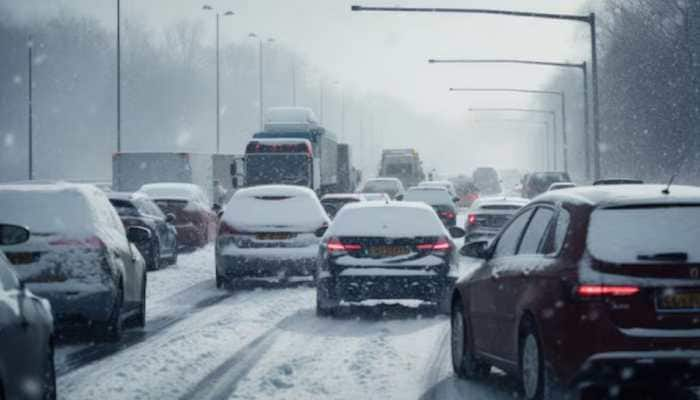Gut Health In Monsoon: 6 Digestive Issues And Simple Steps To Avoid Them
Due to rain and humidity, our entire digestive system slows down during the monsoon. Follow these easy preventive measures to boost digestion during the rainy season and maintain a healthy gut.
Trending Photos
) Gut Health In Monsoon: 6 Digestive Issues And Simple Steps To Avoid Them/ Image source: freepik
Gut Health In Monsoon: 6 Digestive Issues And Simple Steps To Avoid Them/ Image source: freepik In India, monsoons generally arrive between July to September. After a hot and humid summer, everyone looks forward to the first monsoon showers.
As refreshing as the rains may feel, the onset of this season can sometimes bring a host of diseases and infections that can pose a range of health threats, especially if a person has low immunity.
In an interview with Zee English, Dr Rakesh Patel, Consultant Gastroenterology, Fortis Hospital shares the top gut illnesses present in monsoon and simple precautions to prevent them all.
Our digestive system tends to slow down during the rainy season, which can result in problems like indigestion, bloating, and constipation. Therefore, it's critical to take remedial action to regulate your gut health and keep up a healthy overall lifestyle.
Common Monsoon Digestive Problems
Some common diseases during monsoons are transmitted through four primary mediums: mosquitoes, water, air, and contaminated food. Here's what you need to know about them:
Hepatitis A& E: Although there are various types of Hepatitis, Hepatitis A & E is a viral infection that usually spreads in the monsoon. This disease spreads through contaminated food and water, which can inflame and damage the Liver. Some common symptoms of Hepatitis A include fatigue, fever, tenderness in the stomach, yellow eyes, dark-coloured urine, and a sudden loss of appetite.
Gastroenteritis: A common monsoon illness, Gastroenteritis is caused by a bacterial or viral tummy virus. Some symptoms associated with Gastroenteritis include diarrhoea and vomiting. While it can affect people of all ages, Rotavirus is the leading cause of severe childhood gastroenteritis. In most cases, rotavirus germs are generally found in a person’s stool.
This can then spread to other surfaces, especially when a person does not wash their hands after using the bathroom or diaper changes. This is known as a faecal-oral spread if these germs come into contact with another person’s mouth. Also, Rotavirus cases resolve independently, although dehydration is a serious concern, so knowing when to seek medical attention is extremely important.
Typhoid fever: A fatal infection caused by Salmonella Typhi, typhoid fever spreads through contaminated food or water that is especially consumed during the monsoon and pre-monsoon period. Once a person is infected with this virus, it can multiply and spread into the bloodstream. Some common symptoms of this illness are high fever, headache, stomach pain, weakness, vomiting and loose stools.
Dengue: In monsoon, water can become stagnant in and around houses which is a breeding ground for mosquitoes. To ensure that there are no breeding grounds for mosquitoes, it is essential to keep your homes and outdoor areas clean with proper water storage techniques. Most people who get Dengue won't have symptoms. But for those that do, the most common symptoms are high fever, a low platelet count, rashes, and hypersensitivity.
Leptospira: A bacterial disease, Leptospira is a bacterial disease that can affect both animals and humans. The symptoms of Leptospira are varied, which is why misdiagnosis for this condition is relatively high. This disease can be present in some people, even without any symptoms. Some key symptoms include high fever, headache, chills, muscle aches, vomiting, jaundice (yellow skin and eyes), red eyes, abdominal pain, diarrhoea, and rash.
It is essential to treat Leptospira on time as it can cause Kidney damage, Meningitis, Liver failure, and respiratory diseases, which can become fatal.
Bacillary Dysentery: A gastrointestinal disease caused by bacterial infection, Bacillary Dysentery can quickly become a life-threatening disease that requires antibiotics and hospitalization. Acute onset of fever, diarrhoea with abdominal cramps and nausea or vomiting are some common symptoms of this condition. Further, young children, travellers to developing countries and people with weak immune systems are more likely to acquire this disease.
Tips to Prevent Monsoon Illness
Since monsoons can have a high risk of various illnesses, the associated risks can be reduced or even eliminated by following these steps:
- To prevent diseases associated with mosquitoes, make sure to use mosquito nets and bug-repellent machines at home. While going outside, apply mosquito repellent creams, especially when children go outside to play
- Always ensure that stagnant water is not present inside or outside homes
- Maintain personal and environmental hygiene
- Consume seasonal fruits and vegetables that are thoroughly washed and cleaned
- Anyone sick at home or the workplace must isolate themselves and always cover their mouth &nose while coughing and sneezing
- Get vaccinated, especially children and senior citizens, as their immunity levels can make them vulnerable to bacteria and viruses
- As far as possible, avoid consuming food from street vendors and order/eat food from restaurants that serve good quality hygienic meals
- Always boil drinking water that is consumed at home
- Stay hydrated. In the monsoon season, thirst might be reduced compared to summer, but it is essential to have adequate fluid intake so that you do not suffer from dehydration
- Always wash your hands thoroughly with soap and water when coming from outside.
Stay informed on all the latest news, real-time breaking news updates, and follow all the important headlines in india news and world News on Zee News.
Live Tv







)
)
)
)
)
)
)
)
)
)
